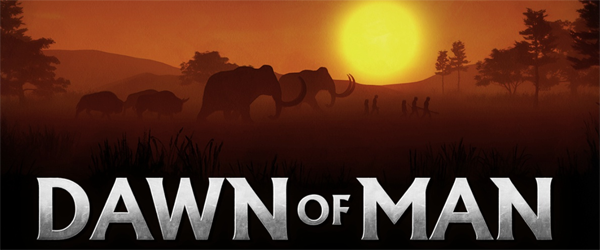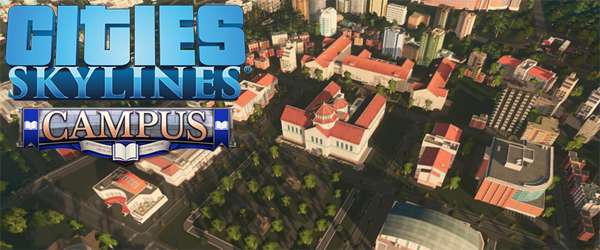
From what I've read, Madruga's indie management sim Dawn of Man has proven to be far more successful than the developers had ever imagined. The game made it onto Steam's top-sellers list the month that it released and was a surprise hit. I've actually had the game on my radar for quite some time. I saw a preview for it back in mid 2018 in a YouTube video about "upcoming strategy games for 2019". I watch those from time to time to see if any new games are coming out in the niche genres that I enjoy -- like city-builders, strategy games, and horror games.
My two favorite PC games are the Civilization games and city-builders like Cities: Skylines, so a management sim / city-builder set during the stone, bronze, and iron ages seemed right up my alley.
A prehistoric city-builder is an idea that is right up my alley!
Like any good management sim or city-builder, Dawn of Man has a "one-more-season" addictiveness that kept me playing into the wee hours of the morning trying to balance my food stockpiles and finish that next set of construction projects before saving and quitting. I'd tell myself that I'd play it for an hour or two, then switch to Sekiro, or work on a Civilization strategy guide, but five hours later, I'd be building palisades and watchtowers to protect my little neolithic farming village from plundering raiders, or sending an expedition halfway across the map to hunt one of the last few remaining wholly mammoths.
Learning by doing
You start the game as a small group of 7 paleolithic humans (half of which are children) living in a handful of animal skin tents. You hunt animals, gather sticks and stones, pick berries and nuts, craft simple tools, and eventually expand your handful of tents into a bronze or iron age city -- complete with walls and an army.
Your progress through the eras is governed by the accumulation of knowledge points. These knowledge points are gained by completing certain tasks or milestones within the game. Your people effectively learn by doing, and through repetition. Each "first" within the game will earn a knowledge point. Build your first hut: gain a knowledge point. Hunt your first deer: gain a knowledge point. Craft your first composite spear: gain a knowledge point. Plant your first crops: gain a knowledge point. And so on.
You accumulate knowledge points by
completing in-game tasks or milestones.
After that, you gain further knowledge points by repeating certain tasks or stockpiling certain resources. Crafting 10 bows will be another knowledge point. Drying and curing 100 units of meat would be another knowledge point. And so on.
You're constantly and gradually earning new knowledge. You can turn in lump sums of these knowledge points for new technologies in a technology tree.
I like this mechanism of "learning by doing". There is no place-it-and-forget-it "research" building or school that passively accumulates knowledge points like what you might see in other strategy games like Civilization. Learning is an active process for your little simulated people, even though most of your knowledge points will come from activities that are automated anyway.
... [More]
8bb5fcaa-40f9-429e-bb8c-c0e44b7d6529|2|5.0
Tags:Dawn of Man, Madruga Games, village, city, strategy, city simulation, city planner, prehistory, paleolithic, mesolithic, neolithic, copper age, bronze age, iron age, mammoth, hunting, gathering, indie gaming
Where can the Marvel Cinematic Universe go after Thanos? My vote is for Doctor Doom to be the next overarching big baddie now that Disney owns Fox (and the Fantastic Four license). Thanos already successfully wiped out half of all life in the universe, and despite the Avengers gaining access to a time machine, they did not undo any of that! How do you up the stakes going into the next phase of Marvel movies?
Well, introducing a multi-verse seems like the logical next step.
It's so logical, in fact that Marvel didn't even seem to hide the idea in Far From Home's marketing. The second trailer, which I think premiered within a week of Endgame's release, pushed the multi-verse idea hard -- as well as spoiling Tony Stark's death for anyone who hadn't made it out to see Endgame within that first week.
It's all spoilers from the next paragraph on. If you haven't seen the movie yet, then I recommend it. It's good! Not Into the Spider-Verse good, but Far From Home is one of the better Marvel movies, and Mysterio is totally awesome.
The Far From Home trailer spoiled the multiverse and death of Tony Stark within a week of Endgame's release.
... [More]
80a6e70e-02af-4c55-9a2d-e5313863e5aa|1|5.0
Tags:Spider-Man, Spider-Man: Far From Home, Sony, Columbia Pictures, Marvel Comics, Peter Parker, Quentin Beck, Mysterio, May Parker, Tony Stark, Iron Man, Nick Fury, Tom Holland, Jake Gyllenhaal, Samuel L Jackson, Zendaya, Jacob Batalon, Marisa Tomei, parallel universe, multiverse, illusion, advertising, marketing, Avengers: Endgame

Hot off of releasing a video in which I criticized Colossal Order's design philosophy for its Cities: Skylines expansions, a new expansion was released. This expansion fulfilled my fears by being similarly narrow in scope compared to the previous expansions. Campus might even be more narrow than previous expansions. Every city will need parks and industries, so you'll have plenty of opportunity to use those expansion features in every city you build. Not every city will need a sprawling university complex, so a given city might not ever need to include any of the Campus content.
I had recently criticized the expansion design philosophy for Cities: Skylines.
Fortunately, there's more options here than a full-blown research university. Colossal Order has added several types of university areas that are more suitable to modestly-sized cities. Sure you may not need that full-blown research university, but maybe your smaller town could use a trade school or liberal arts school?
Even so, the scope here is very narrow! Colossal Order seems to have recognized this, as they are selling the expansion for a couple dollars less than previous expansions.
School is back in session, even for your industries!
Since Mass Transit, new expansions have struggled to find ways to make broader impacts on the game as a whole. They mostly stayed in their lanes. Campus follows suit by not adding anything that isn't related to education, however, those overhauls to education do have some further-reaching ripple effects.
Over-educated citizens used to refuse to take lower-level industrial jobs.
One of the problems that players have had to deal with since the initial launch of the game has been over-educated workers. Once you have schools in your city, it's only a matter of time before virtually everyone has a high level of education -- even children. This would leave all those educated citizens unwilling to take low-education, low-paying jobs in your factories and farms and would starve those industries of eligible workers. Demand for high-end commercial and office zones would skyrocket, and all your educated citizens would take those jobs. This would force those lower level industries to all but shut down once your city grows large enough.
Citizens' education level is now bounded by the level of schooling that they've attended. Prior to Campus, simply having a university in your city would provide everybody attending school (at any level) with a high level of education. Now, this has finally been fixed such that only those citizens who attend higher levels of schooling will receive the higher levels of education. This means that if a student goes to elementary school, but doesn't attend high school (either because they get a job first, or there isn't enough capacity in your high schools), then that citizen will be capped at a low level of education and will remain eligible for those low-level factory jobs.
... [More]
53aeb445-6e6e-4b24-ac8e-7fac34b2e368|0|.0
Tags:Cities: Skylines, Cities: Skylines: Campus, Colossal Order, Paradox Interactive, Steam, PC, city, university, education, college, student, varsity sports, library
My biggest concern going into this new Twilight Zone reboot was with the hour-long format of its premiere. The first episode, "The Comedian" (which was available on YouTube for free as a preview of the show to come), was a bit overlong and dragged considerably in the second half. It had made its point by about halfway through, we could all see where the episode was going, and it insisted on going on for another 20 minutes despite not really having anything left to say.
OK, yeah sure, in the past I've complained about shows like Fox's Cosmos reboot being too short. Commercials cutting Niel DeGrasse Tyson's Cosmos reboot to only 45-ish minutes was simply not enough time for Tyson to give more than an elementary overview of the grandeur of nature or science.
However, The Twilight Zone isn't an educational show about "all that is, or ever was, or ever will be"; it's an anthology of science fiction parables and allegories. Parables and allegories are usually short and simple stories intended to convey a moral or lesson or insight into the human condition. The Twilight Zone doesn't really need a full hour to tell its stories. The twists are easy enough to see coming. This isn't The Sixth Sense, or Fight Club, or American Psycho, or Se7en, or something similar that actually needs a two-hour runtime to build up suspense and intrigue and dot the entire runtime with clues for its twist ending.
The pilot episode "The Comedian" felt over-long.
I was happy to see that episodes later in the first season have variable runtimes. The second episode, "Nightmare at 30,000 Feet" (which is actually a totally different story than the "Nightmare at 20,000 Feet" classic that it is homaging with its title), is under 40 minutes, filled out its runtime better, and enjoyed much tighter overall pacing. The following episode, "Replay", clocked in at 45 minutes, and also enjoyed a much tighter script.
... [More]
55a4fecd-3e7f-4cf2-be91-446004c60d06|1|4.0
Tags:The Twilight Zone, Jordan Peele, CBS, all access, streaming television, Rod Serling, science fiction, anthology, parable, allegory, racism, bigotry, toxic masculinity, date rape, social justice, social injustice, plot twist
|

| 12 | | | | | | | 60 | | 11 | | | | | | | 55 | | 10 | | | | | | | 50 | | 09 | | | | | | | 45 | | 08 | | | | | | | 40 | | 07 | | | | | | | 35 | | 06 | | | | | | | 30 | | 05 | | | | | | | 25 | | 04 | | | | | | | 20 | | 03 | | | | | | | 15 | | 02 | | | | | | | 10 | | 01 | | | | | | | 05 |
|